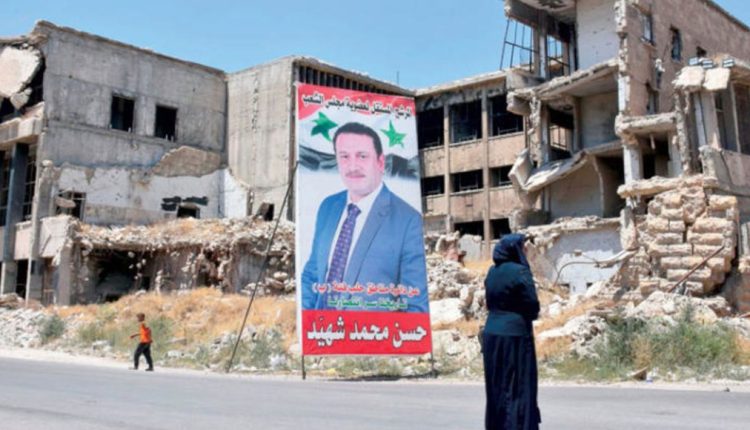
By Ihsan Muhammad
DARAA, Syria (North Press) – The Syrian government is preparing to hold parliamentary elections on July 15, marking the fourth elections since the start of the Syrian conflict. These elections come amid local and international questioning about their transparency and fairness, and potential impact on Syria’s future and political stability.
Residents in Daraa Governorate in southern Syria refuse to participate in the elections. It is the first city to rise against the government and was out of the its control for years before reaching a settlement in 2018.
In July 2018, the opposition armed factions and the Syrian government forces agreed to halt hostilities and reached a ceasefire agreement mediated by Russia in the opposition-held areas in Daraa.
Under the deal, the opposition armed factions agreed to hand over their weapons in exchange for staying in Daraa. Meanwhile, those who opposed the agreement relocated to Idlib Governorate, northwestern Syria, which is under the control of Hayat Tahrir al-Sham (HTS, formerly al-Nusra Front) and the opposition factions.
The candidates for the elections are notably limited to members of the Ba’ath Party and loyalists to the government’s security apparatus, reinforcing perceptions of unfair elections.
Unfair elections
Suhail Qaddah, head of the Syrian Council for Change, which is one of the Syrian opposition political parties, says there are several reasons that make the elections illegitimate and unfair.
He points out that there is clear manipulation and falsifications of results in favor of Ba’ath Party supporters.
Moreover, he adds the ongoing repression against activists and opposition figures prevents them from participating in the elections.
Qaddah explains the absence of an independent international and local oversight to ensure the fairness of the elections further enhances the lack of transparency.
Qaddah tells North Press that the current security and political environment affects the process of elections due to the continuation of the conflict and the lack of a safe environment for voters to express their will freely.
Fake elections deepen the state of division in the community and increase the sense of injustice among the population, leading to more tension and protests in Daraa and even in other areas, and strengthening the government’s security grip, according to Qaddah.
He calls for comprehensive negotiations under international auspices to ensure the participation of all parties according to U.N. resolutions, and for intensifying international efforts to impose sanctions on the government until a genuine political transition is achieved.
Pointless elections
On the other hand, researcher and journalist, Hussam al-Barm, says the residents of Daraa believe the elections are useless.
The France-based journalist adds that the government institutions in Daraa are worthless due to their systematic neglect by the Syrian government.
Al-Barm highlights that Daraa’s residents know that their abstinence from voting, will allow others to fill in, meaning their share of parliamentary seats will go to other governorates.
He adds that some residents will participate in the elections, especially Ba’ath members who see hope in the current regime. He pointed out, however, that there are no signs of a complete election boycott.
There is no real difference between these elections and the previous ones, except that the government needs a way out of its current crisis due to amounting external pressure, the journalist says.
The government is trying to give concessions through some reforms, which the parliament will have a role in legitimizing, al-Barm adds.
Predetermined results
Some people think that the elections will not bring a change to the status quo in Daraa.
Media activist, Muhammad al-Khatib, believes that the parliamentary elections will not affect the political and security situation in Daraa nor contribute to improving the economic conditions.
He said that the elections will reinforce the current state of corruption and security chaos, with the government aiming to make the parliament a tool to show it receives the people’s support and to legitimize the head of “the ruling regime.”
Al-Khatib considers the election results to be predetermined, with candidates choses based on their strong connections to security apparatus.
He also points out that the residents lack accurate information about the electoral process and its fairness, with some even believing that votes will be cast on their behalf while they remain at home.
He believes that the elections will not bring about real change on the ground in Daraa, and that members of the parliament will not be able to stop the security chaos or prevent drug trafficking.
